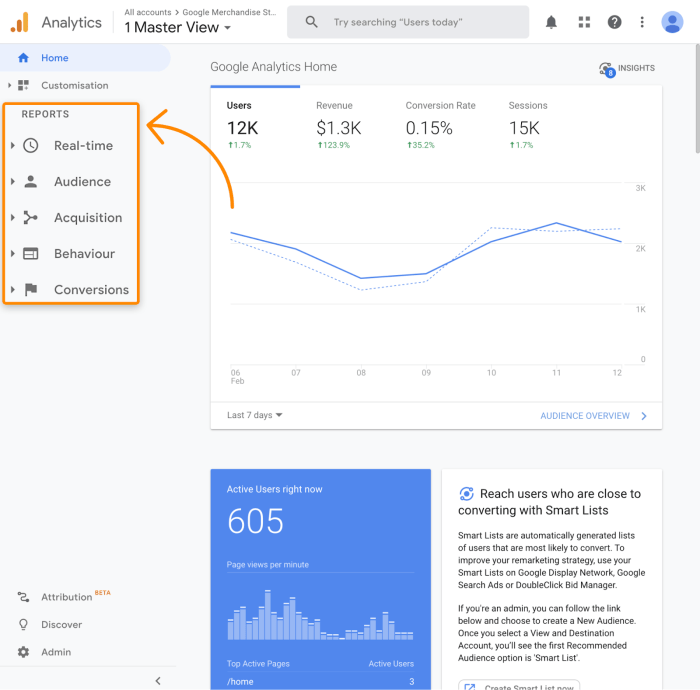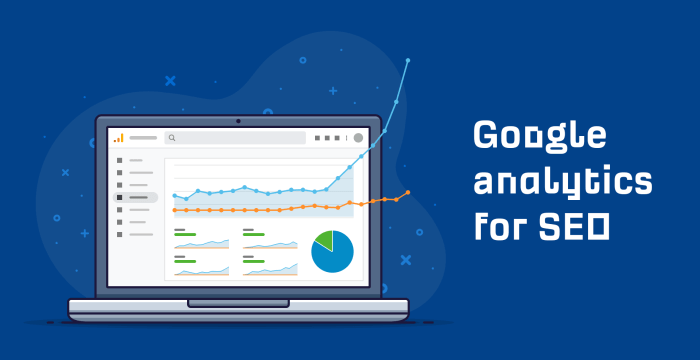Using Google Analytics for SEO – Using Google Analytics for dives deep into the world of optimizing websites for search engines, providing insights on how to boost your online presence and drive traffic through effective strategies. From setting up Google Analytics to interpreting key metrics, this guide will equip you with the tools needed to take your game to the next level.
Introduction to Google Analytics for : Using Google Analytics For SEO

In today’s digital landscape, having a strong online presence is crucial for businesses looking to attract customers and drive traffic to their websites. Search Engine Optimization () plays a key role in improving a website’s visibility on search engines like Google. One powerful tool that can help in this endeavor is Google Analytics.
Google Analytics is a free tool offered by Google that provides valuable insights into website traffic, user behavior, and more. By utilizing Google Analytics, businesses can track key metrics, identify areas for improvement, and make data-driven decisions to enhance their strategies.
How Google Analytics helps in optimizing websites for search engines
Google Analytics offers a wealth of information that can be used to optimize websites for search engines. Some ways in which Google Analytics helps in this process include:
- Tracking performance: By analyzing the s that drive traffic to a website, businesses can better understand what users are searching for and adjust their content accordingly.
- Monitoring website traffic: Google Analytics provides data on the number of visitors, their demographics, and behavior on the site, helping businesses tailor their content to meet the needs of their target audience.
- Identifying high-performing pages: Businesses can use Google Analytics to identify which pages on their website are performing well and replicate the strategies that make them successful.
- Measuring conversion rates: By tracking conversions, businesses can determine the effectiveness of their efforts and make adjustments to improve overall performance.
By leveraging the insights provided by Google Analytics, businesses can optimize their websites for search engines, attract more organic traffic, and improve their overall online presence.
Setting up Google Analytics for
To effectively track performance using Google Analytics, it is crucial to set it up correctly and configure the essential settings for accurate analysis.
Step-by-Step Guide
- Create a Google Analytics account by visiting the Google Analytics website and signing up.
- After creating an account, set up a new property for your website by entering the website name, URL, and time zone.
- Once the property is created, you will receive a tracking ID that needs to be added to your website’s code.
- Insert the tracking code into the header section of your website’s HTML code to start tracking visitor data.
Essential Settings to Configure
- Enable site search tracking to monitor what users are searching for on your website.
- Set up goals to track specific actions that indicate successful performance, such as form submissions or product purchases.
- Link Google Search Console to your Google Analytics account to access valuable data directly in Analytics.
Tips for Customizing Google Analytics
- Create custom reports to focus on -specific metrics like organic traffic, performance, and referral sources.
- Utilize UTM parameters to track the effectiveness of your marketing campaigns and identify which channels are driving the most traffic.
- Set up alerts to receive notifications when there are significant changes in your website’s traffic or conversion rates.
Utilizing Google Analytics Reports for Analysis
Google Analytics provides a wealth of data that can be incredibly valuable for optimizing your website’s performance. By understanding key metrics and interpreting data effectively, you can make informed decisions to improve your search engine rankings and drive more organic traffic to your site.
Key Metrics in Google Analytics Reports
When analyzing Google Analytics reports for , there are several key metrics to pay attention to:
- Organic Traffic: This shows the number of visitors who found your site through organic search results.
- Performance: Analyze which s are driving traffic to your site and their performance.
- Pageviews: Track the number of views each page on your site receives to identify popular content.
- Bounce Rate: Understand how many visitors leave your site after viewing only one page, indicating the relevance and quality of your content.
- Conversion Rate: Monitor how many visitors complete a desired action on your site, such as making a purchase or signing up for a newsletter.
Interpreting Data for Informed Decisions, Using Google Analytics for SEO
When interpreting data from Google Analytics, consider trends and patterns to make informed decisions:
- Identify High-Performing s: Look for s driving the most organic traffic and optimize content around them.
- Monitor Page Performance: Analyze which pages have high bounce rates and low engagement to improve content and user experience.
- Track Conversion Paths: Understand the user journey on your site to optimize conversion funnels and improve conversion rates.
Using Google Analytics for Improvement
Here are some examples of how you can use Google Analytics reports to identify trends and opportunities for improvement:
- Identifying Top Landing Pages: Determine which pages are attracting the most organic traffic and optimize them for better performance.
- Monitoring Mobile Traffic: Analyze how mobile users interact with your site and optimize for mobile to improve rankings.
- Comparing Traffic Sources: Compare traffic from different sources (organic, direct, referral) to understand where your visitors are coming from and focus on high-performing channels.
Tracking Organic Traffic with Google Analytics

Organic traffic refers to the visitors who land on a website through organic search results, excluding paid advertisements. Google Analytics tracks organic traffic by analyzing the source of the website visitors and categorizing them as organic when they come from search engines like Google, Yahoo, or Bing.
Importance of Analyzing Organic Traffic Data for Purposes
Understanding organic traffic data is crucial for purposes as it helps website owners identify the effectiveness of their strategies and the performance of their website in search engine results pages (SERPs). By analyzing organic traffic data in Google Analytics, businesses can gain insights into which s are driving traffic, the behavior of organic visitors, and the overall organic search performance.
- Monitor performance: Analyze which s are driving the most organic traffic to optimize content around those s.
- Identify top landing pages: Determine which pages are attracting the most organic traffic and optimize them for better search engine visibility.
- Track user behavior: Analyze user engagement metrics such as bounce rate, session duration, and pages per session to understand how organic visitors interact with the website.
Tips on Optimizing Organic Traffic using Insights from Google Analytics
Utilize the following tips to optimize organic traffic based on insights from Google Analytics:
- Optimize high-performing s: Focus on optimizing content around s that drive the most organic traffic to improve search visibility.
- Improve user experience: Enhance website usability, page load speed, and mobile responsiveness to provide a better experience for organic visitors.
- Create quality content: Produce relevant, valuable, and engaging content that attracts organic traffic and encourages user engagement.